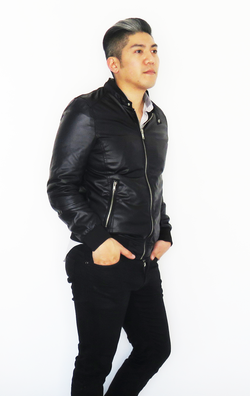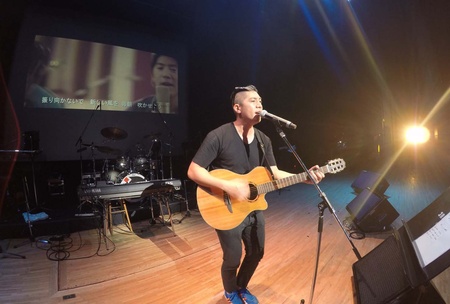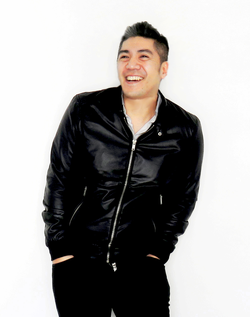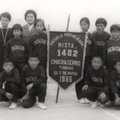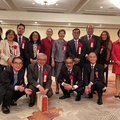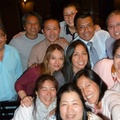—“Grandpa”, why is our face different from that of other Argentines?
—Gus, we are Japanese...
—Are we Japanese despite living in Argentina?
-Yes of course. When I was 17 years old we took a boat with my grandmother and for three months we sailed until we reached Argentina.
The boy Gus discovers that his grandparents migrated from Okinawa in search of a better life in South America, that they dedicated themselves to growing flowers and that thanks to their efforts their descendants today live well.
The dialogue between the Japanese immigrant and his grandson is the preamble to the song “Jikuu no hana”, a boost in the career of Argentine singer Gus Hokama, a turning point that allowed him to go international and bring his music to the land of his grandparents. .
The song was born in 2015 as “Entre carnations”. “It is a song that I have a very special affection for, because it is a song that I dedicate to my grandparents. I felt the need to pay tribute to them for everything they fought for us to be here today. I named it 'Among carnations' because my grandparents dedicated themselves to growing flowers, especially carnations," he says.
“They suffered a lot, without knowing the language, without having money, without knowing the Argentine culture, but they still managed to raise and form a beautiful family. The song is a tribute to them for all their efforts, and as it says in the chorus, I would like them to be walking on clouds full of carnations today and proud of everything they achieved.”
After releasing the song in Argentina, Gus traveled to Okinawa for a scholarship. There he sang the song, but it did not manage to penetrate as he would have liked. Something was missing. It was then that he met Yuko Nakasone and his life changed. She heard the song, noticed its potential and suggested making a version in Japanese.
“That was the beginning of everything...The song 'Entre carnations' became 'Jikuu no hana' in Japanese. Yuko was the one who opened the doors for me for everything that came after. From appearing on Japanese television, newspapers, magazines, recording a single and even participating in the Uchinanchu Taikai festival.” Yuko is his manager today.
THE MAGIC OF SHARING
Magic is not pulling a rabbit out of the barn, but connecting with another human being, creating a bridge where there used to be a wasteland, sharing an emotion. That is what Gus Hokama has achieved with “Jikuu no hana”: that a journalist in Okinawa starts to cry when listening to the song or that in a live performance some attendees tear up while singing it, an atmosphere of communion that makes being musician worth it.
“Everything I experienced in Japan was new and unexpected. I would never have imagined having been able to generate such a strong connection with the public. I believe that it was the conjunction of things that made what happened happen. Having sung 'Jikuu no hana' within the context of an Uchinanchu Taikai, where people from all over the world come together with the aim of remembering our ancestors, and having the possibility of telling them part of the history of my grandparents through a song through something as visual as an animation. That feeling of being able to connect with another person through a song is something sublime, something magical. Something I had never experienced in my life. It's something I'll remember forever."
One of the strengths of the song is that the story is told like an anime. Another peculiarity: the video for “Jikuu no hana” does not start with the musical theme, but with the dialogue outlined at the beginning because Gus felt that it was necessary to contextualize the song.
Knowing Okinawa not only meant an artistic boost for the Argentine singer. In the land of his grandparents a revelation awaited him.
“I think that when I grew up I understood many things that I had not understood about them as a child. Going to Okinawa helped me understand my grandparents better. Knowing their story better, their suffering, their struggle, made me understand simple facts like not leaving leftover food on the plate or thanking my parents regularly for everything we had.”
What Gus rescues most from his grandparents was “their example of struggle and work,” a legacy that has migrated from generation to generation in his family and that he hopes to pass on to his children to perpetuate it.
MUSIC TO HEAL
It may sound cliché to say that someone was predestined for a certain activity, but in the case of Gus Hokama it could well be said that his musical career was announced from his childhood. His mother taught piano and his father was passionate about singing.
His piano teacher, Marcelo Steffanoli, was a key figure in his training. “He was a very dynamic teacher, very practical, he was the one who taught me harmony, from which I began to understand music better and compose my own songs.”
However, he temporarily put music aside to pursue a dream: to be a doctor. He studied medicine and graduated. He had fulfilled a dream, but he had another pending. And that dream began to germinate, unexpectedly, in Peru in 2011.
“I had the immense pleasure of meeting the Japanese community in Lima, and there I participated in a beautiful Nikkei event called Lidercambio. During this exchange I decided to sing, and I sang one of my songs. While she was singing she saw in the faces of the others that she was well received, that they liked her. So being back on the plane to Argentina, I thought I should do something with my songs,” he recalls.
Back in his country, determined to make music more than just a hobby, he began looking for a producer and that's how he met Diego Luna, a friend with whom he works to this day.
That Gus now has a career in music and plans to put more muscle on it does not mean that he has given up on medicine, far from it. You can move and heal people at the same time.
“I think that music and medicine, in my case, go together very well. I don't know if I could feel 'complete' without any of them. Medicine has given me a lot of satisfaction, like meeting wonderful people, just like music. Until now I can do both, luckily,” he says.
Music has been his “ground cable,” even when he didn't imagine it would become his profession. Music is like light coming through the windows of a dark room. When words are not enough, she appears to clear the dark clouds. It has a healing effect.
“I always had the need to clarify everything (typical of my analytical personality). But there are things that are difficult to clarify, more than anything issues related to feelings or emotions. That's why music suited me like a glove. The conjunction of lyrics and music makes emotions or thoughts that I cannot clarify, I do so through music. And that gives me a lot of peace. The moment I can finish a song is like a way to close a stage.”
A new stage of travel and performances is coming for him. In November he will participate in the COPANI (Pan-American Nikkei Convention) in Lima and in January of next year he will fly to Japan to present an album that will include songs in Japanese. There are carnations for a while.
© 2017 Enrique Higa


